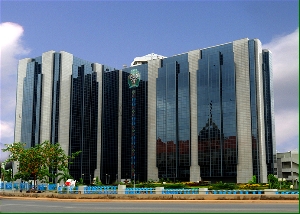Nigerian firms are in a “severe crisis” over the central bank’s failure to settle $2.4 billion of overdue foreign exchange forward contracts, a manufacturing body for producers in the West African nation said.
“Businesses with substantial foreign exchange liabilities face acute credit and liquidity risks due to their inability to settle forward contracts,” the Manufacturers Association of Nigeria said in an emailed statement. “This strains cash flow and jeopardizes overall financial stability.”
The Central Bank of Nigeria said in March it had settled all valid foreign exchange forwards backlogs totaling claims of $7 billion, in an effort to stabilize the market and restore investor confidence.
The settled backlogs were those identified by independent auditors Deloitte Consulting as genuine, it said at the time.
The central bank also said that it did not settle a balance of $2.4 billion in overdue forex contract obligations due to questions over their validity.
The manufacturers body countered the central bank’s position in an emailed statement on Thursday evening claiming that “no clear allegations or infractions have been communicated” to any of its members and “none have been indicted for any infractions.”
It accused the central bank of a “worrisome breach of contract” that has “exacerbated currency risk for businesses, leading to substantial financial losses and operational disruptions.”
The central bank did not immediately respond to a request for comment.
One of Africa’s biggest economies and crude producers, Nigeria has battled years of acute foreign exchange scarcity arising from low crude production and a lack of economic diversification.
The central bank failed to meet foreign currency obligations to importers and investors seeking to repatriate profits, which left manufacturers struggling to pay for imported inputs, deterred foreign investors, and hampered fresh inflows.
While a reform of the foreign exchange market initiated in June last year that allowed the naira to trade more freely has led to a sharp rise in foreign exchange inflows, it has also led to a depreciation of the naira by about 70%, hurting businesses exposed to dollar liabilities.
The unsettled backlog has left local businesses facing an erosion of trust from their foreign suppliers due to the inability to honor issued letters of credit, the manufacturers’ body said.
“As companies grapple with the inability to fulfill their offshore obligations due to the CBN’s non-delivery of dollars, many face the grim prospect of downsizing or shutting down operations completely,” the group said.
The producers’ body urged the central bank “to give serious and expedited consideration to the imperative of the sanctity of contracts, explore avenues to resolve outstanding obligations, and prioritize the interests of businesses that have acted in good faith.” “Reneging on these legally binding contracts potentially undermines the CBN’s credibility and may damage investor confidence,” it said.
Business News of Saturday, 10 August 2024
Source: bloomberg.com

















